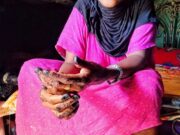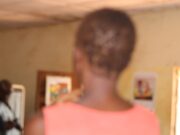Today, I resume the topic of infertility. I’ve previously written about the issue here: “Why are you Wasting Your Husband?” Hadassah Trip talks about her 7 Year Journey of Trying to Conceive.
I also wrote another related article here: What Does Mother’s Day Feel Like for a Woman Facing Infertility Challenges?
Today I share the story of Patricia Atieno, who has endured more than five decades of life as a woman unable to bear children. Yes, I’m talking of over fifty years of infertility. I recently met 68 year-old Patricia in Kibera in Nairobi where she stays, and we had a lengthy chat about her experiences as a woman -in a society that defines a woman’s worth as her ability to give birth. This is Patricia’s story, as she narrated it to me.
“Growing up as a young girl in a rural village in Kitale, Trans Nzoia County, I was one of the few lucky girls who were enrolled in school. But that was until I got to class six when my schooling came to an abrupt end.
I was Just a Girl
You see, there was this uncle who would come visit us at home and whenever he did so, he would come with one particular friend. One day, out of nowhere, my father informed me that I would be getting married to my uncle’s friend.

I cried, knowing very well that it would mark the end of my schooling. I knew this for a fact because I had many friends in the village who were already married, an engagement that had marked the end of their schooling. I was just a girl, one of the few girls who had managed to reach class six, and I desperately wanted to continue with my education.
I told my parents as much, and while my mum was understanding, my father would hear none of it. He had already made the decision. In fact, he argued that my school fees would now be put to better use –that of educating my brothers to higher levels. And that is how, at the age of 14 years, I stopped going to school and began life as a married woman.
I left home to start a new life in the capital city of Nairobi, where my husband worked as a civil servant. My husband was a much older man, previously married and with three children. He was apparently separated from his wife.
Daily Bleeding
My tribulations in marriage started almost immediately. In my second month of living with him, and every other month after that, my husband would ask me if I was pregnant. And every month, the answer would be the same: I wasn’t.
But I was having a problem.
Every month, my period would last for weeks, and it would be a very heavy flow. In addition, the pain that would accompany my menses would be unbearable. Despite seeking various medical interventions in different hospitals, including miti shamba (traditional herbs), the problem never went away.
I remember that by the time I was 20 years old, I would bleed every single day of the month. Serious, heavy bleeding that would make me so weak.
I knew how desperately my husband wanted me to have his child. Every day, I prayed, cried, asking God for a miracle. But I never conceived, not even once.

Abuse and Hospitalization
While going through these health problems, I noticed a change in my husband’s attitude towards me. Whenever I did anything small that he didn’t like, he would give me a beating. I would experience beatings on an almost daily basis.
In addition, he would openly have extra-marital affairs with different women. Whenever I asked him about this, he would yell at me, warning me against questioning his ways as a man.
Sometimes, he would answer me by saying he preferred spending time with real women, women who had the ability to give him children. His hurtful words and actions would pierce me so deep. In fact, many times, he would accompany his words with slaps, blows and kicks on me.
One time my husband beat me up so bad that I had to be admitted in hospital. When my parents came to see me, I begged them to allow me return home with them. But my father refused, saying that I was a married woman and I had to learn how to endure the challenges in marriage, just like other women did. I remember seeing my mum pleading with him, saying my husband would kill me, but my father ignored her.
Removal of my Uterus
Meanwhile, my daily bleeding and related pain became so bad that doctors told me that my uterus had to be removed. They said it had become a matter of life or death for me. So that’s how, at the age of 20 years, my uterus was removed -what they called a hysterectomy.
The doctors were kind and counselled me well before the surgery, with the implications of having no uterus clearly explained to me. I would never be able to have my own children –borne of my womb. I wept. I cried for my future, wondering what kind of life I would be condemned to without a womb.

Life in my marriage after that became unbearable. The little care that my husband used to show me now ceased. He told me my infertility was not his problem, and went further to even call me his ‘fellow man’ because I didn’t have a uterus anymore.
He would laugh as he asked me: “What qualifies you to call yourself a woman yet you can’t give birth? Of what use are you as a woman? What purpose do you serve in my life exactly?”
A few months later, he chased me away, saying we couldn’t live as two men in the house.
Starting Life on my Own
After that, I tried returning back home to my parents, but it was tough because I was told I was a married woman and so I needed to go back to my husband and his people. I couldn’t be given a piece of land to till and eke a living because my land was in my husband’s home.
I was unwanted both by my people and my husband. Basically I was now on my own. I returned to Nairobi to try and look for work. Since I didn’t have a good education, the best job I could get was that of a house girl, which is what I’ve done for decades. However, my age won’t allow me to do heavy chores anymore, so I now only undertake casual light jobs in my Kibera neighborhood.

My life as a woman unable to bear children has not been easy. Neighbors, friends and relatives have always referred me to as ‘the barren woman’. Whenever someone is describing me, the first description they give of me is ‘yule mama tasa’. It’s a label I’ve carried with me for decades; it became a part of my identity.
I’m an Evil Witch
I remember there was one time years ago my neighbors’ children came to my house as they often did, and as I was narrating folklores to them, a few of their mothers suddenly called out for them, ordering them to quickly return to the house.
It was abrupt, but I didn’t give it much thought until weeks later when I asked one child why they no longer came to my house to listen to my stories.
Continue Reading Next Page








































The attitude towards childless women is just sickening! I dropped a tear for Patricia may God hold her hand. Thanks Maryanne for sharing.
Hi Lourdes thanks for the feedback. It all starts with you and me. Stigma and discrimination is fueled by people, so we need to deliberately change our attitudes. The more we talk about it, the more things will change, and the more support we will begin to accord women with infertility challenges.